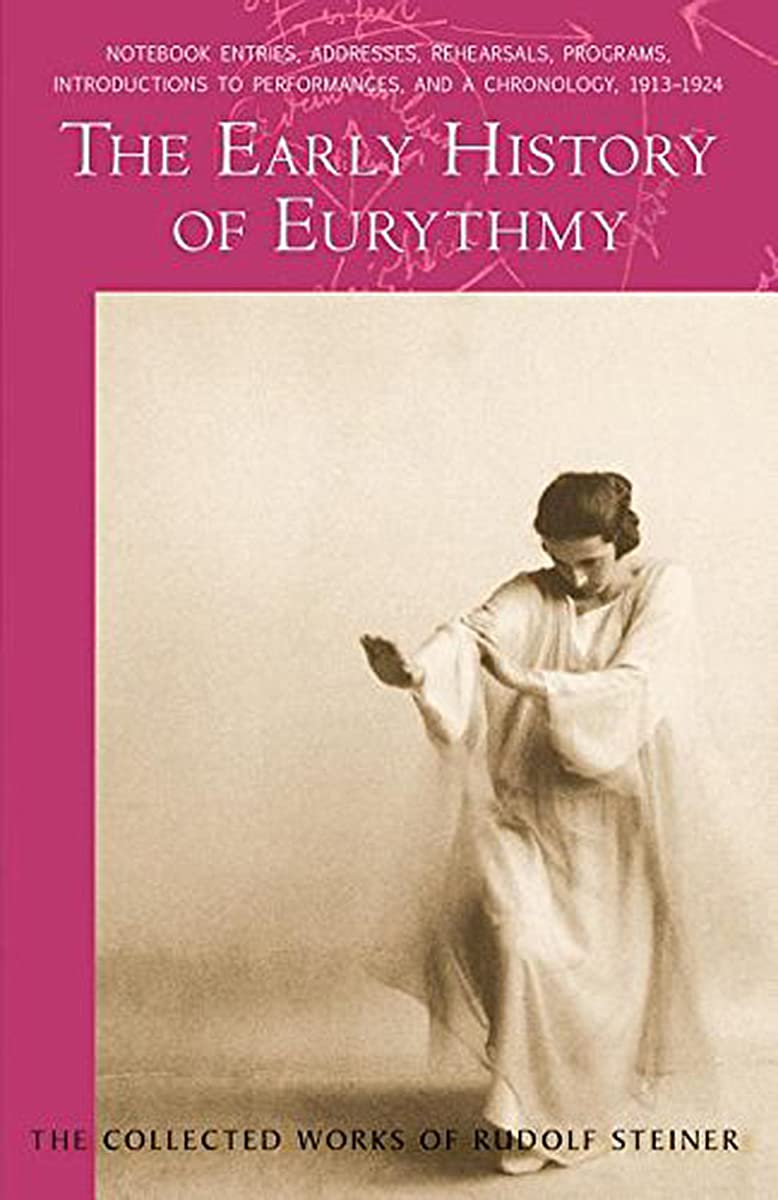Rudolf Steiner Bookshop
The Early History of Eurythmy
The Early History of Eurythmy
Couldn't load pickup availability
Rudolf Steiner (author)
Translated by Frederick Amrine
Notebook entries, addresses, rehearsals, programs, introductions to performances, and talks given before 16 eurythmy performances (CW 277c)
The arts either:
Arise from observation -- bypassing the concept
or out of experience -- without arriving at a concept. --
Eurythmy turns the inner experience of the human being into external movement.
Artists have sought impressionism; but nature cannot be grasped in this way, for the senses already forbid mere impressions. One cannot hold fast to the expressions, because the means of representation do not reveal the expressions.
Eurythmy:
It is an art form that makes use of the human being as an instrument, of our human capacities for movement as means of expression. Language takes up thoughts. But it brings them into the will.
Only what flows from the will is artistic.
--Rudolf Steiner (entry in a notebook, Dornach, Feb. 14, 1920)
The Early History of Eurythmy is the first of three volumes of Rudolf Steiner's "eurythmy addresses," short introductory talks preceding the earliest performances of this new art of movement. Of the nearly 300 transcripts that survive, few have thus far been translated into English.
This volume presents, chronologically, the addresses related mostly to drama, generally, and specifically to stage performances of Goethe's Faust and Steiner's mystery dramas. In addition, it features all of Rudolf Steiner's notebook entries on eurythmy, along with all of the extant eurythmy programs from 1913 to 1925, which yield invaluable insights into Steiner's taste and aesthetics.
Frederick Amrine's engaging introduction emphasizes that eurythmy is an important episode in the history of dance, but has been unjustly neglected. He contends that eurythmy is a continuation of an aesthetic revolution that began not in Europe but in America; that the original impulses leading to "new dance" were deeply spiritual; and that there are deep but largely unrecognized affinities between "new dance" and eurythmy.
This counter-narrative about the prehistory of eurythmy within the history of dance should be of particular interest to English-speaking anthroposophists, because it identifies the pioneering work of three American women as the all-important context for the development of eurythmy: Loie Fuller, Isadora Duncan, and Ruth St. Denis. Drawing on extensive historical documentation, he states that it is eurythmy rather than modern dance that is the rightful heir of Fuller, Duncan, and St. Denis.
Rudolf Steiner (b. Rudolf Joseph Lorenz Steiner, 1861-1925) was born in the small village of Kraljevec, Austro-Hungarian Empire (now in Croatia), where he grew up. As a young man, he lived in Weimar and Berlin, where he became a well-published scientific, literary, and philosophical scholar, known especially for his work with Goethe's scientific writings. At the beginning of the twentieth century, he began to develop his early philosophical principles into an approach to systematic research into psychological and spiritual phenomena. Formally beginning his spiritual teaching career under the auspices of the Theosophical Society, Steiner came to use the term Anthroposophy (and spiritual science) for his philosophy, spiritual research, and findings. The influence of Steiner's multifaceted genius has led to innovative and holistic approaches in medicine, various therapies, philosophy, religious renewal, Waldorf education, education for special needs, threefold economics, biodynamic agriculture, Goethean science, architecture, and the arts of drama, speech, and eurythmy. In 1924, Rudolf Steiner founded the General Anthroposophical Society, which today has branches throughout the world. He died in Dornach, Switzerland.
Publisher : SteinerBooks, Inc; Translation edition (1 Sept. 2015)
Paperback : 380 pages
ISBN-13 : 9781621480723
Dimensions : 14.99 x 3.05 x 23.11 cm

